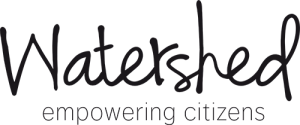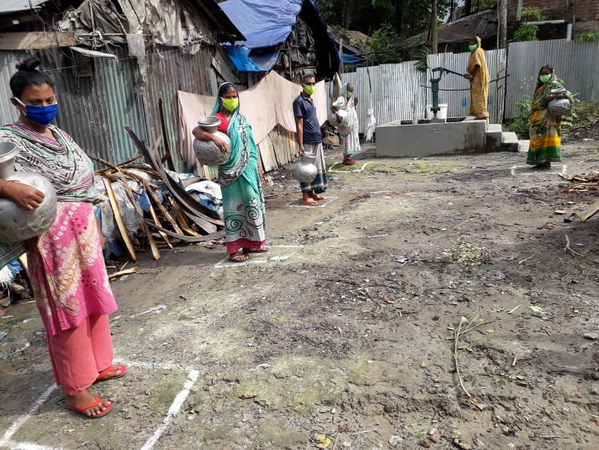Report of a Watershed empowering citizens webinar on adjusting your advocacy to COVID-19 pandemic.
The COVID-19 pandemic is forcing development organisations and programmes to rapidly readjust their advocacy strategies. How do you not only support local or national governments in their emergency planning but also hold them accountable? At the same time, how do you maintain the original focus of your advocacy while practising social distancing? How do you use online and socially distant appropriate approaches to deliver messages and do outreach to decision makers?
The Watershed empowering citizens programme attracted over 60 participants to the webinar “Adapting your advocacy to COVID-19 health crisis” held on 15 April 2020. Speakers from Watershed partner organisations in the Netherlands, Bangladesh and Kenya explained how they were adapting their programme advocacy in the countries where they are working. In the Q&A session participants from Ghana and Burkina Faso chipped in with their stories.
Watershed: setting the scene
Evita Rozenberg from IRC in The Hague explained why strong advocacy by civil society organisations (CSOs) is essential during a crisis. She introduced how advocacy is being implemented by CSOs in Watershed, where all programme countries have developed their own advocacy strategy. Because of rapid shifts in political policies and restrictions caused by lockdowns, we now need to revise those strategies. While revising them we should keep in mind that the COVID-19 crisis also offers us a window of opportunity. WASH is being promoted as an integral part of the health response and the first line of defence. As one of the participants, Director of Development Partnerships at Conservation International Colleen Sorto pointed out in her post-webinar blog: now is not the time to “take a pause on our advocacy plans, but actually we should be preparing for what will come next”.
In the Netherlands, for the first time the Dutch Minister for Foreign Trade and Development Cooperation mentioned the importance of WASH and handwashing in a political speech covered by the media. What can CSOs do? Examples include combating fake news with accurate information, ensuring accountability of emergency responses, taking action to protect CSO co-workers, and promoting systemic solutions to emergencies so that no-one is left behind.
Kenya
The Watershed programme in Kenya works in coronavirus affected areas. Country programme lead, Patrick Mwanzia from Simavi told how, starting from April 2020, Watershed is replicating the Trac.fm Wottazela (“voice of water”) campaign developed in Uganda. This interactive live radio programme encourages listeners to give free SMS feedback on water-related issues, such as access to water, which is especially relevant now when it comes to hygiene.
Due to restrictions on travel and face-to-face meetings, the programme is exploring the use of communication tools such as mobile phones, WhatsApp calls, Zoom and Lifesize. One practical problem they had to overcome was to choose a teleconferencing tool that circumvented the local network’s limit of 6 meeting participants. The Kenyan programme intends to launch grassroots citizens Zoom forums on COVID-19. These forums would help inform a lobby memorandum to government to involve citizens’ voice in incorporating WASH in COVID-19 responses.
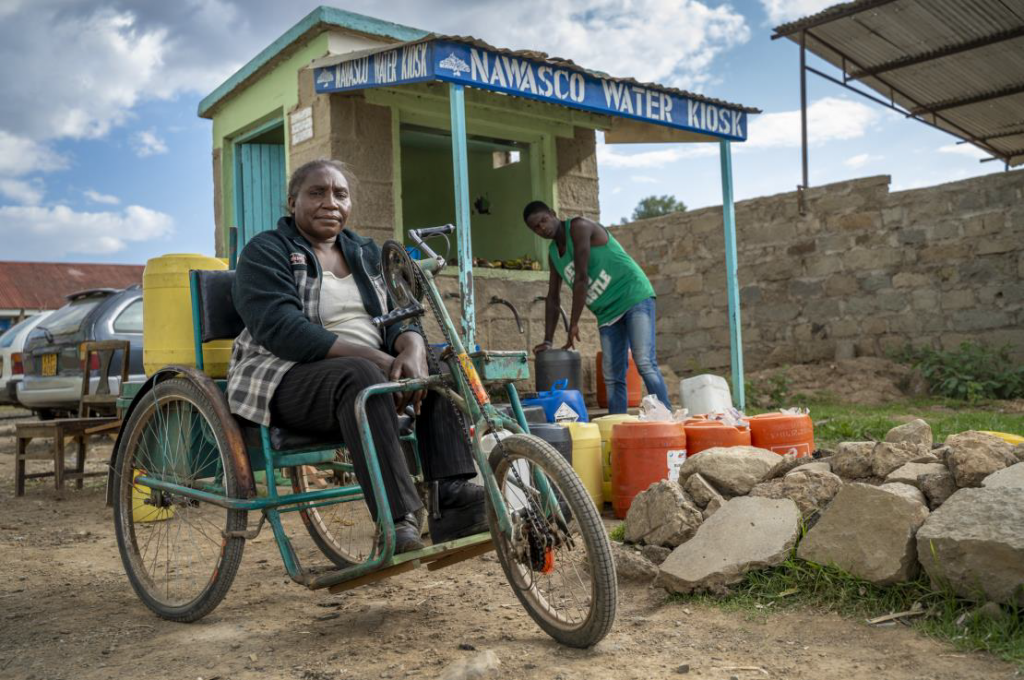
Valentine Mombafi Keraita, Chairlady of Laikipia Women with Disability Amplified Voices. Photo: Patrick Mwanzia/Simavi Kenya. See her in action in the Watershed video.
Making a Zoom teleconference inclusive can be a challenge. A solution, suggested Patrick, is to give airtime to people with smart phones who act as spokespersons for marginalised groups such as the youth, the disabled and slum dwellers. He cited the recent example of Valentine Mombafi Keraita, Chairlady of Laikipia Women with Disability Amplified Voices, who was able to participate in a meeting via a smart phone video call.
Other important decision-making platforms for CSO voices to be heard are the national and county level COVID-19 emergency response committees. At county level, Watershed is engaging with the committees in Kajiano and Laikipia. In Kajiano county, Watershed partner NIA (Neighbourhood Initiative Alliance) is helping to get WASH/Water Resource Management CSOs at the table. Based on an assessment of the county emergency response plans, the Watershed programme will formulate advocacy messages specifically addressing human rights and social inclusion.
At the request of Attorney General Office, Watershed partners provided inputs to a CSO memorandum on an emergency COVID-19 public health act. The partners’ contribution focused on respecting the human rights to water and sanitation, and ensuring CSO inputs in sectoral coordination.
What will be the post-pandemic impact on Watershed advocacy? Malesi Shivaji from Watershed partner KEWASNET (Kenya Water and Sanitation Civil Societies Network) reflected on possible impacts and what is required to hold duty bearers accountable. He stressed the need to highlight any potential long-term developmental impacts during the emergency itself. This requires updating tools for data collection on emergency WASH investments, potential negative impacts on issues such as gender balance or sanitation, and reversals of pre-pandemic gains in policy, investment etc. Specifically for Kenya, Malesi mentioned the possible backlash when the government’s policy to prohibit water disconnections during the pandemic is lifted while the water meters are still running and unpaid bills accumulate.
Bangladesh
At the beginning of April 2020, 27 out of Bangladesh’s 64 districts were put on partial or complete lockdown. Since then, staff of most international NGOs, including Watershed implementing partner WaterAid Bangladesh, are unable to travel to the field and have to work from home. WaterAid’s efforts focus on promoting the practice of handwashing not only among Watershed partner organisations but also more broadly within the WASH sector and beyond. It launched the #FightCoronaUnited campaign in partnership with the World Health Organization (WHO) and the Institute of Epidemiology, Disease Control and Research (IEDCR).
WaterAid’s Ranjan Kumar Ghose explained how the Watershed programme in Bangladesh managed to quickly adapt its advocacy strategy in response to COVID-19. Involvement in WASH cluster meetings helped to inform the shift of Watershed’s advocacy strategy to online actions (SMS, local TV) focusing on handwashing and social distancing.
At national level, Watershed programme staff took part in a COVID-19 coordination meeting with the Minister of Local Government, Rural Development and Cooperatives (LGRD&C), mayors and other key stakeholders focusing on slums and low-income communities.
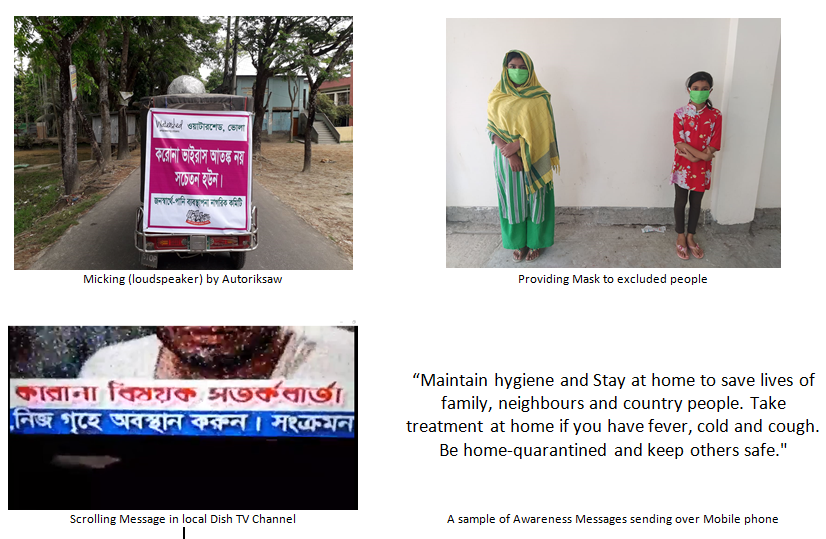
Awareness messages on coronavirus at Bhola, Bangladesh. Photo: Parthasarathi Kuntal
In Watershed’s focus sub-districts Bhola and Ramgati, national NGO DORP facilitates joint action by local government and local NGOs. This includes the promotion of handwashing and social distancing in combination with the provision of masks and handwashing stations. More traditional promotional channels such as “miking” (loudspeakers) and local print media are used to reach vulnerable groups without access to mobile phones or TV.
Ghana
The lockdown in Accra in combination with upcoming elections is making it difficult for CSOs to get their voice heard at the national level, says Veronica Ayi-Bonte from IRC Ghana.
Up till now, there was no open virtual forum in which CSOs could participate. The IRC-supported Ghana WASH Resource Centre Network (RCN) recently announced it has set up an online space for the National Level Learning Alliance Platform (NLLAP). Basilia Nanbigne of the Coalition of NGOs in Water and Sanitation (CONIWAS), mentioned there were discussions with the Ghana WASH Journalists Network (GWJN) to host webinars.
CONIWAS continues its dialogue with government through media engagement. It released a press release on World Water Day, which referred to COVID-19 and managing water resources. While the government has promised to pay water bills for all Ghanaians for 3 months, Basilia stressed the need to advocate for sustainable WASH services for all, both now and after COVID-19, as many still lack access.
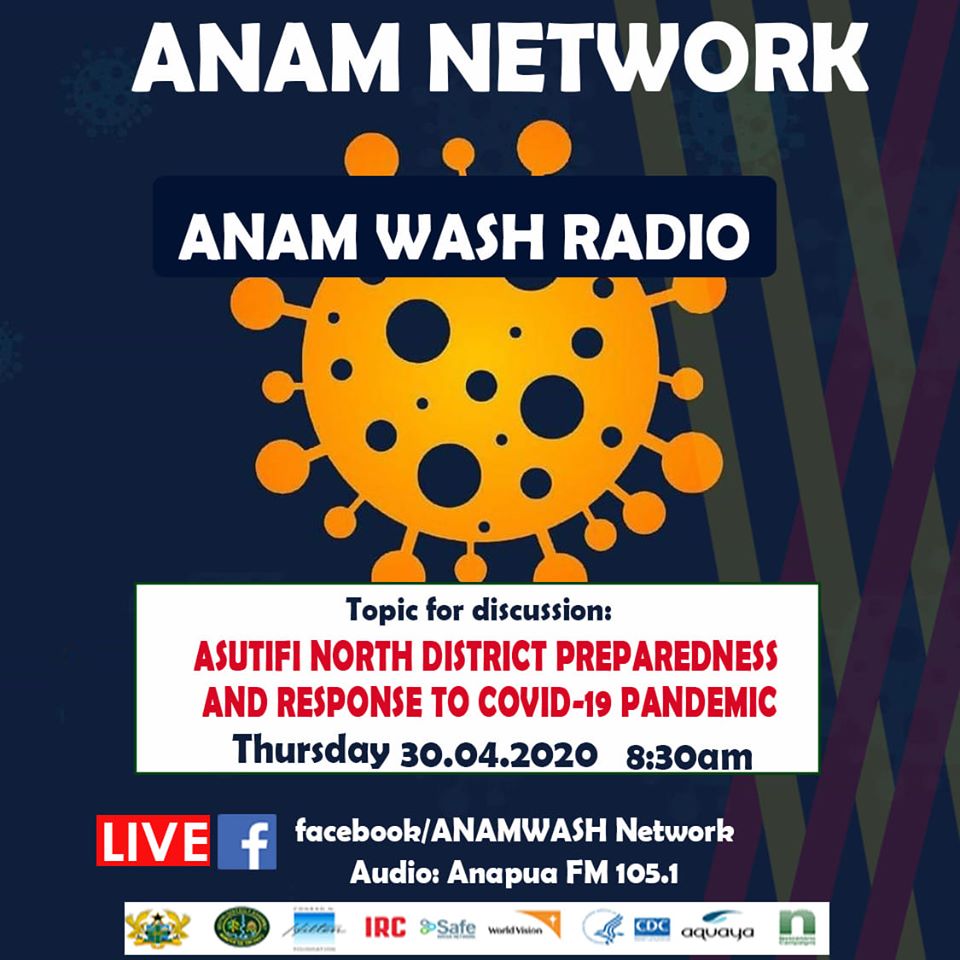
Watershed partner Hope for Future Generations (HFFG) works in the Tarkwa Nsuaem municipality area, which is not under a total lockdown. Mercy Amokwandoh reports that HFFG has partnered with district authorities and local government to conduct community and district level sensitisation on COVID-19 through community radio and community information systems (including district vans). They have developed jingles, infographics and pen drives with COVID-19 messages in local languages and distributed hand sanitisers and liquid soap.
Burkina Faso
Although Burkina Faso is not a Watershed programme country, the IRC country office has launched a powerful COVID-19 advocacy campaign. Arnauld Adjagodo explained how IRC Burkina made use of a WhatsApp group Les Pros du WASH-BF and its media connections to put pressure on the government to prevent a rural water crisis. Peter McIntrye has written up the full story for IRC’s website.
Recommendations
Webinar facilitator, IRC’s Elynn Walter, drew up the following list of recommendations based on the presentations and the Q&A session discussions:
- Adapt your advocacy strategy by adjusting tactics and messaging
- Be opportunistic, reach out to government officials and organise online campaigns. For example on behavioural change (handwashing, social distancing, solidarity)
- Monitor decision-making of government – is there a focus on leaving no one behind?
- Ensure COVID-19 emergency planning includes a systemic WASH approach and investments in handwashing in health facilities
- Ensure that existing WASH services are not discontinued, that struggling utilities have the funds available to continue the services
- Ensure that WASH services reach the marginalised and rural areas
- Ensure ‘do no harm’ and social distancing in reaching most marginalised
The webinar PowerPoint presentations are available on Slideshare. View the video recording of the webinar below.
———
Summary
- While COVID-19 forces CSOs to revise their advocacy strategies it also offers a window of opportunity to promote WASH messages
- CSOs in Kenya, Bangladesh, Ghana and Burkina Faso give practical examples of how they are adapting their advocacy strategies
- Lockdowns and social distancing are challenging CSOs to find the best and most inclusive channels to communicate with all stakeholders from marginalised communities up to national government
- Advocacy strategies should be able to address potentially negative post-pandemic impacts during the crisis itself; this requires collecting data on emergency WASH investments
- WASH CSOs need to have a voice both at sector and COVID-19 emergency response platforms
This blog was written by Cor Dietvorst, IRC.
